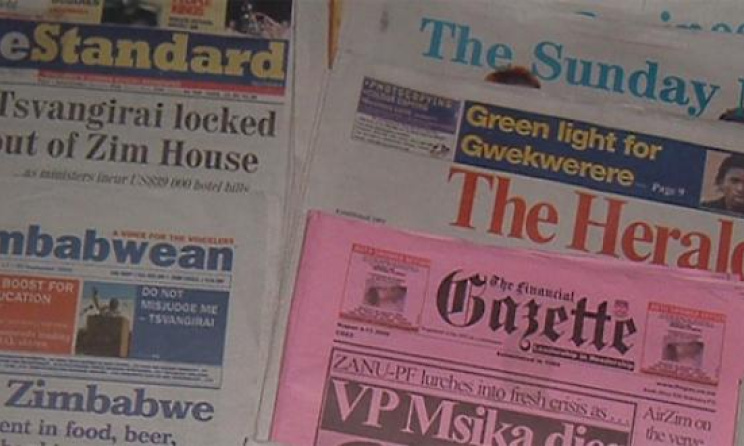Music and the media in Zimbabwe
By Kudzai Chimhangwa
The relationship between Zimbabwe’s music field and media sector can best be characterized as a cat and mouse one, with songs churned out by artists having to toe a certain line in government controlled media. However, a lot has changed over the years at least in terms of audience’ access to music of their choice with the advent of new technology.
 Zimbabwe newspapers
Zimbabwe newspapers
Print Media
Zimbabwe has some of the oldest newspapers in Africa. The Herald, government’s main newspaper, replaced the Mashonaland Times and the Zambesian Times, which were operational from the late 1890s. The capital city-based Herald also has an active website which provides daily up to date information on showbiz trends[i]. Another government publication is the Sunday Mail[ii]. The paper is popular due to its pull-out sections that range from news and business to entertainment. This paper is based in Harare, while its counterpart in Bulawayo is the Sunday News[iii]. Government also runs another Bulawayo based paper, The Chronicle, which largely caters for audiences in the southern part of the country[iv]. All the government owned newspapers fall under the Zimpapers stable which is listed on the local bourse.
The country has a vibrant independent media network, which provides an alternative voice for musicians deemed to be unacceptable for publicity by government. During the height of political tension in 2008, it was a taboo to be found reading an independent paper and still is in some remote parts of the country. For example, The Daily News[v], which was a fierce government critic in its editorial line, was shut down in 2003 but re-opened in May 2010. It is owned by private operator Associated Newspapers of Zimbabwe. Another private operator, Alpha Media Holdings owned by Trevor Ncube, runs a wide array of independent papers that have been well-received in the market. The group publishes The Zimbabwe Independent[vi], a business-focused weekly published every Friday, The Standard[vii], a weekly published every Sunday, as well as the daily newspapers NewsDay[viii], opened in June 2010, and Southern Eye[ix].
Another private newspaper, The Zimbabwe Mail[x] hit the streets on 9 December 2013 and is owned by Transport and Infrastructural Development minister Obert Mpofu through his various investment vehicles. The Zimbabwean newspaper is arguably the most widely distributed independent newspaper in the country, available in a tabloid print format and also published online[xi]. It is run by a group of Zimbabwean journalists from around the world who came together to start the first newspaper for Zimbabweans in exile.
Radio
Ever since Zimbabwe’s independence in 1980, the ruling party, ZANU-PF, has fiercely resisted moves to open up the airwaves, while using the state broadcaster, the Zimbabwe Broadcasting Corporation (ZBC) [xii] to entrench the party’s power through propaganda activities. Radio stations that fall under the ZBC stable are Spot FM, Radio Zimbabwe, Power FM and National FM. All four stations are widely accessible upon entry into the country on various frequencies, although not available in remote areas. These stations strictly play pro-government or non-political local music and touch on foreign music occasionally.
Radio offers the best example of how government policy has influenced the media and music industries. Musicians seen to conform to official ideology get preference over those who do not. For example, in 2002, the then Minister of Information, Jonathan Moyo, and a host of musicians, among them former war veterans Dick Chingaira (aka Cde Chinx) and Marko Sibanda supported by the Police Band recorded an album in 2002 that supports the government’s controversial land reform policy, titled Hondo Yeminda – 3rd Chimurenga. Meanwhile, the state managed to elbow out “politically incorrect” music from the airwaves by censoring such compositions. Songs by Thomas Mapfumo, Leonard Zhakata and Chirikure Chirikure among other critical works were banned. Mapfumo moved to United States in 2001 after the ban of songs from his Chimurenga Explosion album, which tore into party officials’ extravagance and poor governance, fearing for the safety of his family. Similarly, songs from Zhakata’s 2003 album, Hodho, never received any of attention on airwaves but were largely circulated underground.
In 2001 government announced that it was enacting a law that made it mandatory for radio DJs to apportion 75% of all programming to local music. This was later followed up by a decree later that it had to be 100% local content - in a bid to prevent young people from being “brainwashed” by Western propaganda and music. In his farewell speech to ZiFM in 2013, Mandiwanzira confirmed that the 75% local content requirement was now an unavoidable reality for broadcasters and ZiFM would lead the way in this regard. Out of this sudden demand for local music arose a new genre, called Urban Grooves. Musicians such as the Gweru-based twins Roy and Royce, Sanii Makhalima, David Chifunyise, Leonard Mapfumo, Roki, Betty Makaya, Extra Large and Maskiri are among those generally regarded as the foundation of this new genre.
In 2012, two private radio stations, StarFM and ZiFM were launched. StarFM is owned by government-controlled Zimpapers and offers diverse political views and an expanded entertainment schedule[xiii]. ZiFM Stereo[xiv] was set up by Supa Mandiwanzira, a Zanu-PF member of parliament and Deputy Minister of Media, Information and Broadcasting Services, who publicly bade farewell to the station in October 2013. The station began broadcasting on 15 August 2012. The two stations are seen as direct competition to the ZBC's commercial radio station, Power FM. Zimpapers recently announced plans to open a local commercial radio station in Mutare (located in Zimbabwe’s Eastern highlands) within the next 10 months as it waits for licence application approval from the Broadcasting Authority of Zimbabwe (BAZ)[xv]. It will be called Diamond FM.
Online radio stations are also growing in popularity. A new and independent online station, AfroZim Radio has made an impact on urban socialites with a taste for wide genres of music[xvi]. The station is largely run by Zimbabweans based in the diaspora. Radio Kunakirwa[xvii] (previously known as XBC Jumpoff) boasts a team of aspiring individuals dedicated to promoting local Zimbabwean music through podcasts as well as an entertaining blog. Another online station is Zim Net Radio, which plays a selection of traditional and contemporary Zimbabwean genres[xviii], although it is not accessible to the general public.
Community radio stations are also popular in Zimbabwe. The Zimbabwe Association of Community Radio Stations (ZACRAS)[xix] is the umbrella body of community radio initiatives in the country. Founded in 2003, ZACRAS strives to assist communities in establishing community radio stations across Zimbabwe, as well as providing conceptual and technical training and regulating their conduct so that they conform to the standards of community radios. Another important industry body is the the Postal and Telecommunications Regulatory Authority of Zimbabwe (POTRAZ)[xx], which was established to exercise licensing and regulatory functions with regard to the allocation and use of satellite orbits and the radio frequency spectrum in Zimbabwe for all purposes.
Television
This medium of mass outreach continues to be a popular means for artists to reach out and be known. The state broadcaster, ZBC TV, flights a Weekend Request show almost every Friday, where viewers get the opportunity to request music videos by their favourite artists. Besides ZBC, viewers with access to DStv[xxi] can tune in to a plethora of music channels, including Channel O (channel 320), Trace (325), One Gospel (331), MTV Base (322) and VH1 (323), which provide a wide variety of music genres from the African continent and beyond. For example, Channel O is a highly regarded outlet for African talent and videos and primarily targets young people. MTV Base is mainly dedicated to playing urban music, with a focus on R&B, hip-hop, kwaito and dancehall.
New Media
The proliferation of new technology has revolutionized music outreach and appeal to young people in Zimbabwe as they share music online. Besides the online radio stations mentioned above, local mobile operators Telecel, NetOne and Econet are presently rolling out new products aimed at luring more customers, a development which has seen more young people sharing Urban Grooves music via messaging platforms. Another website, Ezomgido Online[xxii], specialises in Zimbabwean music and film. The project is managed by Songear Ltd UK for recording studios and artists in Zimbabwe and seeks to make Zimbabwean music and film available in all corners of the world at the click of a button. Vangodzatunes[xxiii] is another popular online retailer/distributor.
Music blogs are also growing in popularity and cater to more specialised audiences. For example, the website Young Zimbabwe has a blog section that aims to showcase exciting new music for Zimbabwe’s youth[xxiv], as do Greedysouth[xxv], Three Men On A Boat[xxvi] and Zimbablog[xxvii], among others. Some are based outside the country, such as Zvembira[xxviii], which focusses specifically on the Mbira.
New technology is thus offering some alternatives to the traditionally state-controlled media in Zimbabwe, helping to provide music listeners with greater freedom of choice and musicians themselves with new avenues to reach their fans.
[i] www.herald.co.zw [ii] www.sundaymail.co.zw [iii] www.sundaynews.co.zw [iv] www.chronicle.co.zw [v] www.dailynews.co.zw [vi] www.zimind.co.zw [vii] www.thestandard.co.zw [viii] www.newsday.co.zw [ix] www.southerneye.co.zw [x] www.thezimmail.co.zw [xi] www.thezimbabwean.co [xii] www.zbc.co.zw [xiii] www.starfm.co.zw [xiv] www.zifmstereo.co.zw [xv] www.baz.co.zw [xvi] www.afrozimradio.com [xvii] www.radioknk.com [xviii] www.zimnetradio.com [xix] www.zacraszim.org [xx] www.potraz.gov.zw [xxi] www.dstv.com [xxii] ezomgido.com [xxiii] www.vangodzatunes.com [xxiv] youngzimbabwe.com/music-blog [xxv] www.greedysouth.co.zw [xxvi] www.3-mob.com [xxvii] www.zimbablog.com [xxviii] zvembira.com


























Commentaires
s'identifier or register to post comments